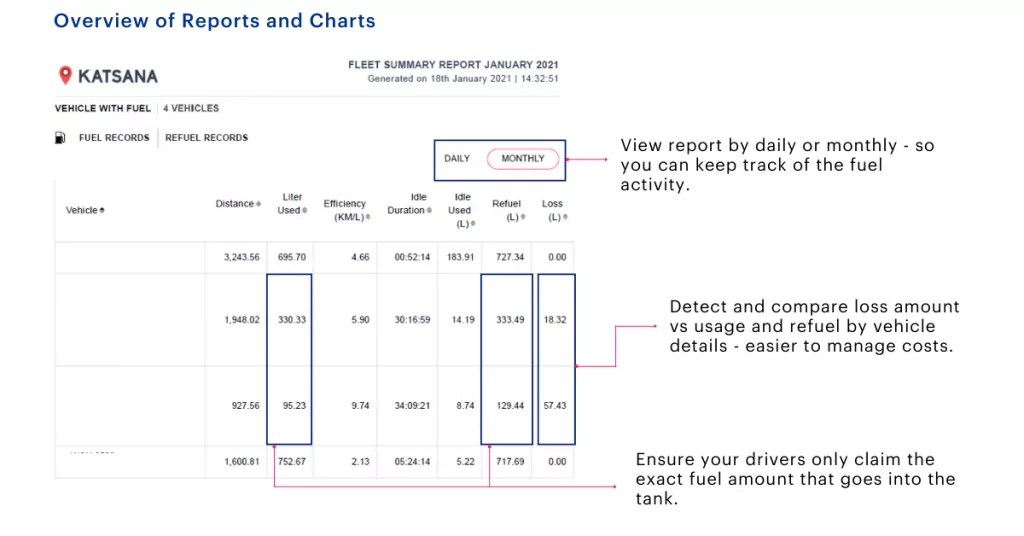Why is fuel management practice so important?
An average of 40% of overall fleet costs is attributed to fuel consumption. From being the second largest expense category, fuel is one of the sources of stress and lost money to most fleet owners. Definitely, if it is not being controlled.
Let’s dive into what, why, and how fuel management systems work best for your fleet operation.
What is a fuel management system?
Fuel management is a system that allows fleet managers to control fuel usage, activity, and costs. It incorporates both software and hardware architectures. A telematics system is used to communicate vehicle data in real-time.

Digitalization gives many great benefits to fleet managers which translates day-to-day tasks into better and more efficient ones. No more manual tracking, old-fashioned paper recording, and redundant filling need to be done.
With such data in hand, it is easier to manage fuel-related costs and control their consumption.
KATSANA Fleet Management System

Our fuel management system delivers data that is digitally designed to ensure the security of your vehicles. Real-time data is easily accessible on our platform, practically anytime, anywhere and on any device. Features are configurable, upgradable and supportable.
Why do I need a fuel management system for my fleet operation?
Automation is a good start to why you need a fuel management system. Manual entry spreadsheets are replaced with an automatic data entry system, providing accurate analytics for better decision making.
1. Control fuel costs and minimize consumption of fuel
The fuel management system allows fleet managers to see a clearer picture of fuel data. KATSANA platform gives you the advantage of viewing every detail about fuel transactions, fuel consumption, and managing any spot that needs saving. Fleet managers will have a better understanding of fuel buying and take necessary actions when needed.

2. Prevent fuel theft and leakage
Real-time updates on fuel amount in any vehicle allow fleet managers to have constant monitoring of fuel activity. One of KATSANA’s features is to send alerts to fleet managers when theft or leakage occurs. An average of 10% lower rate of theft or fraud is recorded with constant monitoring of fuel consumption.

3. Encourage good driving behavior
Impulsive driving is dangerous and costly. Speeding, acceleration, and braking affect fuel efficiency by 25% (on highways and stop-go traffic). By practicing fuel management, fleet managers are able to incorporate good driving habits among drivers that are safe and fuel-friendly.
What are the other benefits I gain with this system?
The main purpose of a fuel management system is to provide fleet managers with real-time insights on fuel consumption and optimize operating costs.
Other benefits include:
- Providing more control on vehicles fuel consumption
- Gaining comprehensive insights on the fuel efficiency
- Mitigating operational risks
- Optimizing fuel allocation
- Improving route planning and asset management
- A better vehicles maintenance schedules
How does the fuel management system help me save money on fuel?
Simple!
Fleet managers leverage fuel management systems to achieve better fuel efficiency and cost reduction. Now, let’s look at the operational benefits the fuel management system brings.
1. Driving behavior
To what extent does driving behavior affect fuel costs?
An international study shows that poor driving behavior can burn up to 30% of fuel costs. Speeding, sudden acceleration, and harsh braking cause a higher fuel consumption.
A custom fuel management system helps fleet managers to:
- Monitor drivers’ behavior that has a negative impact on fuel efficiency.
- Make better decisions on fuel savings (and where to cut necessary fuel costs).
- Set speed parameters and monitor any speeding events to coach drivers with safe driving practice.
2. Engine idling causes fuel waste
Did you know that fuel waste can go as much as 8 liters for every 2 hours of idling?
Fleet managers can use a fuel management system to identify high fuel usage due to excessive idling (at any specific time and date for a vehicle). It is easier for fleet managers to overcome the problem and save costs by generating specific reports which include:
- Warming up engine longer than the necessary time
- Leaving the engine running during stops (for rest) or deliveries
3. Vehicle maintenance
Maintaining vehicles in good condition help to save fuel costs by an average of 5% over time.
Through the KATSANA fuel management platform, features are configurable to tell fleet managers when vehicles are due for maintenance. Additionally, it also identifies when fuel consumption is affected by potential maintenance issues via a comprehensive dashboard.
Other factors (caused by vehicles maintenance) that can increase fuel efficiency and save fuel cost are:
- Constantly checking tire pressure and wear
- Regularly replace fuel filters when necessary
- Reducing rolling resistance by keeping vehicles axles aligned
Recap
Fuel management is a tedious process that constantly brings fleet managers headaches and stress, on top of burning the costs for the business operations.
Such system is a gateway for fleet managers to access crucial data, and fuel usage patterns and have better cost control. It is a system that is suitable for fleet owners who wish to see a desirable reduction in fuel costs; in an automated and digitized system.
Start saving now with the KATSANA Fuel Management System.


